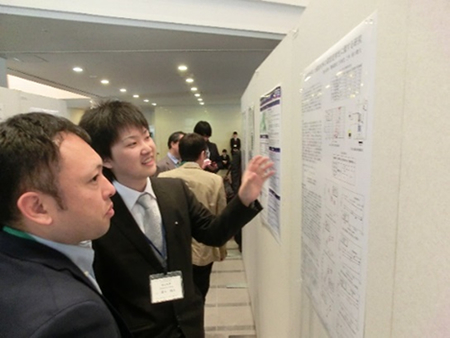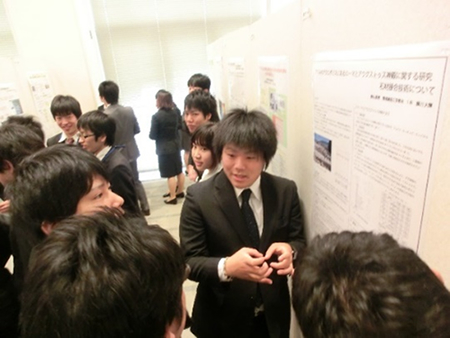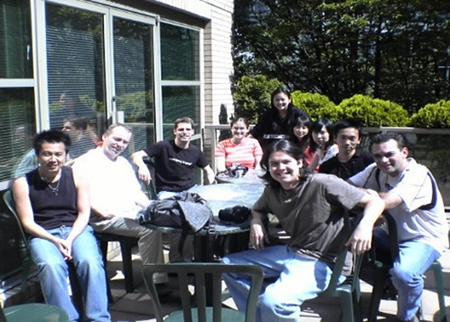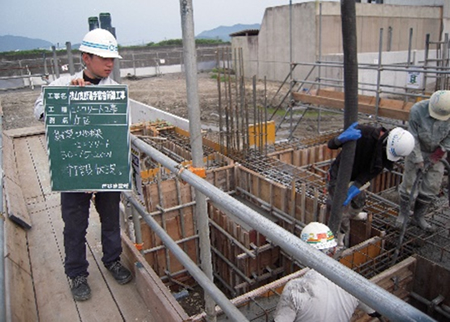What is an Advanced Course?
The Advanced course
The advanced course is a two-year educational system that enables students who have graduated from the national institute of technology to pursue opportunities for advanced education and research. At present, all the Colleges of Technology have the advanced course system. Tokuyama College of Technology added this system in 1995.
The students can obtain the JABEE certificate in Communication and IT-based Design Engineering and a bachelor’s degree after the completion of the two-year advanced course and the JABEE program. The National Institute for Academic Degrees and Quality Enhancement of Higher Education certifies the degree. So the completion of the advanced course means that you are qualified as a Fundamental Engineer in Applied Science, which could successfully lead you to be a Professional Engineer and a world-class engineer in the future. After obtaining the bachelor’s degree, the students can go on to a graduate school.
The entrance fee is 84,600 yen and the college tuition is 234,600 yen per year. They are both considered to be inexpensive in the Japanese higher educational system.
Features of Advanced courses
1.Emphasis on Research
The most important objective is the “Advanced Research”. The advanced course encourages students to write their Research papers. Research papers should be presented and published in domestic or international journals.
Final Goal: Publishing a paper
Requirement: Presenting a paper
Goal of the Advanced Research: The graduation research reports are published every year. Faculty members who are qualified for the Advanced Research assist the students in their thesis.
2.Publishing the Thesis
The advanced course encourages students to write their thesis papers. Students’ research papers are often honored by academic societies.
3.A Wide Variety of Liberal Arts
In order to be a world-class engineer, one must be able to think and act globally. One should also have a command of English and good communication skills, even in Japanese. Besides an extensive knowledge of fundamental science, one should always be ready to work as an engineer with leadership quality.
A wide variety of liberal arts courses such as “Engineering Ethics”, “Cross-Cultural Study”, “Japanese Technical Writing”, “Life Science” and “Current Industrial Issues” are offered to train the students to be such world-class engineers.
4.Instilling Rudimentary Knowledge and Skills, Putting Special Emphasis on English Communication Skills
It is necessary to have a command of English to be a world-class engineer. The advanced course system offers a lot of useful English courses so that the students can fulfill that requirement. One of the classes prepares them for the TOEIC test to meet the requirement of at least the minimum numerical score shown below.
5.Training Students to Use Their Extensive Knowledge Practically and Develop Their Creativity
One of the aims of technical college education is to ensure the students be able to produce things with technical prowess. Extensive knowledge is necessary for the students to achieve that aim, especially in interdisciplinary fields to which our college pays close attention. The advanced course provides the students with lectures, experiments and exercises for helping them use their extensive knowledge in a practical way.
Developing their creativity is also very important. Heuristic classes and exercises help students combine the extensive knowledge and creativity nurtured through the five-year regular study to hone their technical edge.
6.A practical Internship Program
To be a good engineer requires experience in dealing with actual problems. As an opportunity for such experience, the advanced course assigns internship to all first-year students. They ae required to work as an interns at various companies and schools for about three months.
By tackling on-the-spot problems at companies, they will find what knowledge is useful, what skills need to be improved and how to solve future problems.
7.Passing Qualifying Examinations
To prove objectively that the advanced course students have gained enough practical knowledge and a good command of information technology, they are required to pass at least one of the qualifying examinations, such as “The Information Technology engineers Examination”, “DIGITAL TECHNOLOGY CERTIFICATION”, “CG-ARTS CERTIFICATION TEST”, “2nd-Class Kenchikushi”, etc.
8.Entrance of Engineers of Company
National Institute of Technology, Tokuyama College encourages collaboration with companies providing opportunities for the engineers of companies to enter the advanced course. The advanced course enables engineers to resolve engineering problems that have arisen and to refresh their skills.
9.Peculiar Entrance Examination System
There are three entrance examination system i.e., “Examination by presidential Recommendation of Various Colleges”, “Examination by Industrial Recommendation” and “General Entrance Examination”.
Applicants and Admissions
| Year | 2021 | 2022 | 2023 | 2024 | 2025 | |||||
|---|---|---|---|---|---|---|---|---|---|---|
| Classification | Apply | Admit | Apply | Admit | Apply | Admit | Apply | Admit | Apply | Admit |
| Recommended | 13 | 13 | 12 | 12 | 12 | 12 | 10 | 10 | 11 | 11 |
| General Exam | 17 | 12 | 17 | 8 | 26 | 6 | 11 | 7 | 10 | 2 |
| Total | 30 | 25 | 29 | 20 | 38 | 18 | 21 | 17 | 21 | 13 |


Presentation at an academic conference
Mechanical and Control Engineering Course
The course aims to educate the students to be able to design and develop machines controlled by computers.
Mechanical and Control Engineering Course puts an emphasis on natural science, experiments, practical training, advanced research ad internship program. It also offers elective subjects related to materials, energy, information, and design and production to help the students develop their technical knowledge.
Computer Science and Electronic Engineering Course
The course aims to educate the students to be able to design and develop various computer-based systems.
Computer Science and Electronic Engineering Course puts an emphasis on natural sciences, experiments, practical training, advanced research and internship program. In order to meet the needs of a highly-developed information-oriented society, it also offers elective subjects related to compound systems, such as information processing system, information and communications system, and system for computer-applied machines.
Environmental and Civil Engineering Course
The course aims to educate the students to be able to design and develop infrastructure and architectural space, making the best use of computers.
Environmental and Civil Engineering Course puts an emphasis on natural sciences, experiments, practical training, advanced research and internship program. It also offers elective subjects related to cities and traffics, disaster prevention, environment, and architecture to help the students develop their technical knowledge.
Internship
General information
Advanced Course students experience internship program on their first year. They are required to develop what they have learnt at college, gain a problems solving skill, and cultivate their sensitivity and creativity by dealing with actual matters during internship.
| Students | 1st year students in Advanced Course |
|---|---|
| Period | Over 2month from June to August |
| Credits | 6 Credits |
| Employers | Companies affiliating with Tokuyama College Techno Academia, government offices, universities, city halls, prefectural office, and so on, including overseas companies and universities. |
| Submission | Diary and report on the internship |
| Assessment | Students will be evaluated referring to the report, the presentation they make, and the assessment by their employers. |
| Schedule | February:Guidance for the internship March- May:Apply for the employers, Choose a theme May:Manners training, Pre-training June- August:Internship, Submit a report September:Receive evaluation sheets from employers, Internship Report Meeting is held |

Internship in a foreign country

Long-term Internship
